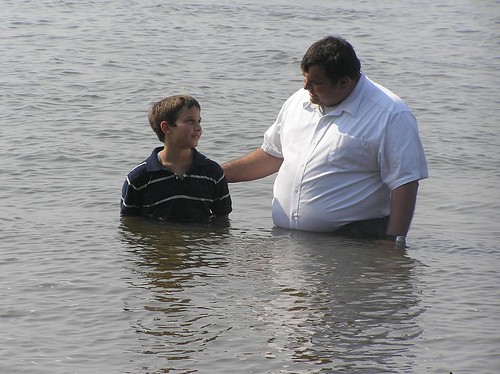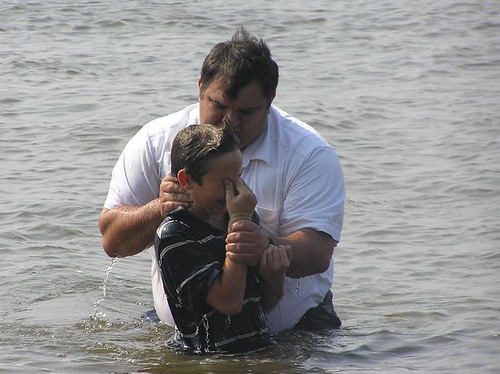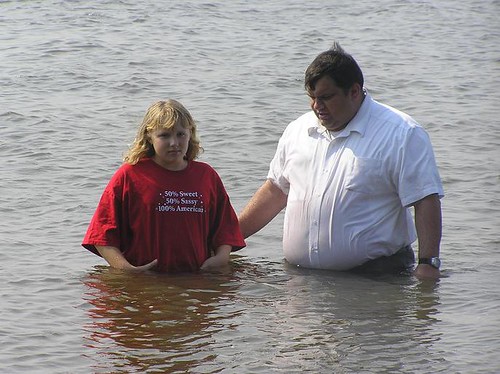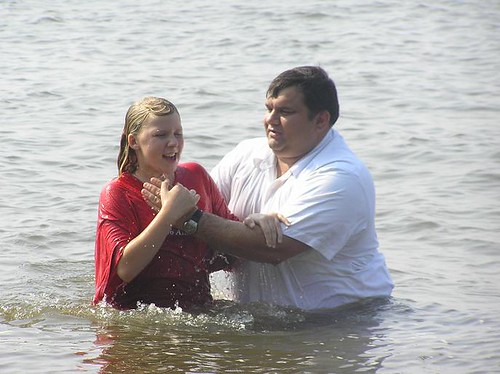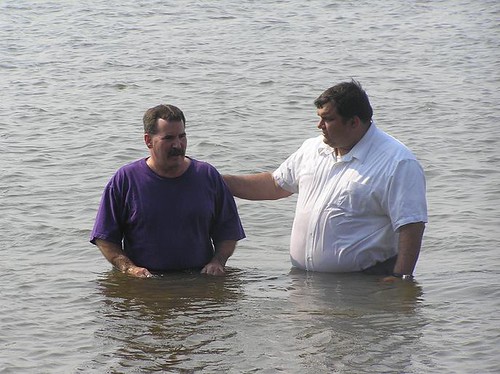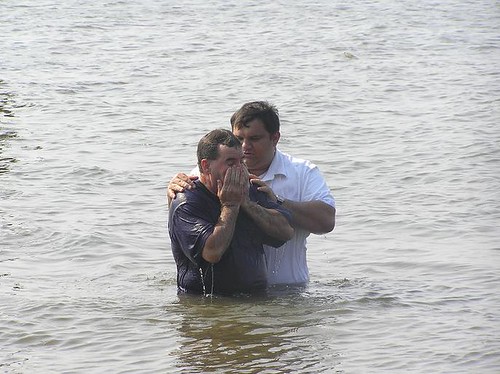Over at SharperIron, Dr. Joel Tetreau, Senior Pastor at Southwest Valley Baptist Church in Gilbert, Arizona and an Adjunct Professor at International Baptist College in Tempe, Arizona has posted an article entitled, Three Lines in the Sand (this article has been broken into several parts and can be found here, here, here, and here). This article is an extension and revision of an article that he published in May of 2005 entitled, A Line in the Sand. The gist of these articles is the establishment of a taxonomy in which various "types" or "moods" of Fundamentalism (or fundamentalism, if you prefer) are described.
I have basically been waiting until the posting of the entire article was completed before making comments. (I did ask one question about Dr. Singleton after the first post, but I have not posted on any of the threads other than that question, I believe.) I wanted to hear Dr. Tetreau out and see what it was he was advocating. At this point, all but the final section has been posted and it my understanding that the last section is going to discuss his "Type C fundamentalism." I admit that I am making these comments without having had an opportunity to view this last section, but based upon reading and interacting with Dr. Tetreau (or Joel, as he would prefer), I am pretty sure I know where he is going with the last section. (I reserve the right to advise and amend my comments if he comes out with something radically different in the last section than what I have been led to believe.)
These articles have been the source of much discussion in the Fundamental blogosphere - at the time of this writing, the three posts written by Joel have generated over 16,000 views and 400 comments alone at SharperIron. In addition to Joel's post at SharperIron, there have at least two "Filings" threads on SI regarding this topic and one other thread - generating another 3,500 views between them. Away from SharperIron, Dr. Dave Doran has given an assessment of the presentation on Pastor Chris Anderson's Blog at My Two Cents and Dr. (almost) Mike Riley, who serves with Joel at IBC has written an evaluation of Joel's presentation as well at his blog (I have not yet had a chance to read Mike's comments, yet, but expect to do so when I get the chance).
As I read the articles, there is a sense in which part of me thinks that this whole discussion is "much ado about nothing." However, when I consider the fact that this has generated so much discussion, I am inclined to think that there may indeed be value in taking the time to consider what it is that Joel has written. Further, as the terms have been thrown around now for over a year and we now finally have an explanation of the terms, it makes sense at this time to evaluate what Joel has written. Finally, even though the articles are very recent, I have already had one person use Joel's Types to ask me about a church that I had recommended to them, so people are already trying to use the Types for labeling churches and I feel that fact alone warrants a response.
Joel seems to be really good guy. As I told the lady who asked me about the church, Joel "is a good old Arizona boy and us guys from Arizona have to stick together - even if I have not been back "home" to Arizona in over 15 years." I genuinely like Joel from what I know of him. He has a good spirit, can be very humorous at times and has even commented on my blog. Please do not take any disagreement that I may indicate in this argument as a personal attack on Joel. It is not intended to be so.
When Joel first posted his presentation last year, I believe I was probably the first one to take objection to what he had written about Types - albeit there were only two types back then. Many of my same concerns from that original discussion are still unanswered in this more lengthy revision. (My post in this regard can be found here.)
My comments here are not being made because Joel has offended me with his post or that he has struck some kind of nerve. (I find it funny that some of the "Type Bs" on SI - to use Joel's Types - have repeatedly tried to use the liberal methodology of claiming that disagreement with something equals fearing that thing. It has been interesting to see them attack Greg as though he is a "Typophobe" because he has had some legitimate questions about the whole taxonomy.)
So, below, for my two or three readers who are still reading, is my assessment and comments about Dr. Joel Tetreau's Three Lines in the Sand.
1. The Types as presented to Dr. Tetreau are too broad
By this, I am not referring to the fact that there are too many people in each group, but rather, that Joel has joined too many unrelated things together into his taxonomy.
If Joel had limited his discussion to an examination of three different views of separation, I believe that this could have been helpful. If he had wanted to address leadership styles or standards or demeanor or any number of things, this presentation may have been more valuable.
A. This broadness results in inaccurate characterizations
As it is presented, the categories include so many different things that it is hard to imagine that very many people completely fit into any one type and this makes the type system more than just unwieldy, it makes it inaccurate.
For instance, Joel has linked a leadership style of "dictatorship in decision making" to his Type A.
I had seen in Type A Fundamentalism a high degree of "dictatorship in decision making." I had been convinced that in the early New Testament church there was mutual submission and consideration in the decision-making process. I saw almost none of that with most Type A ministries. What I did see were pastors who believed they had a right to make the final call on all decisions. I saw (and continue to see with many of the A guys, ministers who believe they are answerable to no one except God). They might take items to the congregation but only if they absolutely have to. I believe that elders (a plurality of them) should oversee the spiritual sphere of decision making, and the deacons should oversee the physical minutiae of decision making.
Included in this view is the idea that Type A's are opposed to shared leadership and that shared leadership (read: multiple elder rule) is something that is connected to Type B. Notice the following statement by Joel:
Type A's typically hate the concept of a plurality of leadership
(See his comments on Chris' blog for more examples of this view.)
Now, regardless of my position on multiple elder rule, the reality is that this issue is not related to a view of separation. The Free Presbyterians and Bible Presbyterians have been known as holding to a view of separation that Joel would characterize as Type A, yet have a Presbyterian form of government. The Ohio Bible Fellowship - again, a group that Joel has characterized as Type A - also have many churches that hold to a multiple-elder rule type of polity. If Joel's connecting these two issues were a legitimate connection, it would seem that one of the most outspoken groups of Type As (the OBF) should at least fit into his taxonomy.
For what its worth, I doubt that you would find anyone in my church who would claim that I am anywhere close to a "dictator in decision making" - if anything, I tend to wait too long in decisions because I want to have a consensus before we move on just about everything.
B. This broadness results in a limited usefulness
By creating categories that are so broad, he has limited the usefulness of his categories. For instance, when the lady asked me whether the church I had recommended to her was a Type A, B, or C church, I could not answer that question without saying things to the effect - they would probably be described as Type A in regard to this issue, Type B in regards to this issue, etc.
Now, I recognize that there are time when it is helpful to be able to say that a golden retriever is a mammal, but generally it much more helpful for someone to be able to at least say that the golden retriever is a dog.
C. This broadness results in unfair "lumping"
One of the consequences of having such broad categories is that people have to be "lumped together" to fit into the broad categories. Doing so results in characterizing people with vastly different personalities, views and ministry styles in a way that makes others think they are the same thing.
Now, to be fair, I have done this myself. In fact, one of the results of this discussion is that I have seen this error in my own approach to others. I have been the type of person who has held on to the designation of "New Evangelical" to describe men like Dever, etc. I have been wrong to do this . I still do not believe it is accurate to refer to them as Fundamentalists, but I do agree that they do not fit into the mold of what Ockenga described when he coined the term. For example, the conservative evangelicals do not question the legitimacy of separation (although they apply it or fail to apply it in a way that I believe is accurate), they do not focus on social concerns, or achieving intellectual respect, etc. I have not changed my position on my issues with this position, but I do see that I have unfairly labeled them by using too broad of a category.
When I look at Joel's taxonomy, I find the same problem. He lumps fine and reasonable men like Dr. Dave Doran with men and ministries who are dictatorial and abusive. The basis for that lumping? Not because there is really that much of a similarity between these ministries, but because they have similar views when it comes to separation from disobedient brethren.
Another example of this comes in the third part of the article, where Joel comments,
Because of their understanding of separation passages, they have developed their own forms of music, literature, even Bible versions.
Here Joel indicates that Type As have developed their own forms of Bible versions. The only thing I can imagine he would mean by this is something to do with the King James Version. The problem of lumping is again seen here, as two of the people he is currently discussing this with - including one he has essentially accused of being the prototypical flagship producer of A clones (Dr. Dave Doran) - uses the NASB. Furthermore, many of the A schools that were listed by Joel were in the Coalition that produced the video in response to PCC's attacks about Bible versions. Again, this is an example of the unfair and inaccurate lumping produced by the taxonomy and explanation that Joel has produced.
2. The Types wrongly connect positions with dispositions.
A second significant issue that I have with Joel's Three Lines in the Sand (by the way, would not there only be two lines in order to produce three groups) is that he wrongly connects a position with a disposition.
While Dr. Tetreau repeatedly comments that being an A is not a bad thing, his words belie the fact that it is indeed a bad thing.
Notice some of the language and descriptions used by Dr. Tetreau concerning Type As.
"The pyramid" refers to the strict and often abusive approach to a centralized and dictatorial approach to decision making found with (IMO) an usually high percentage of Type A senior pastors.
Friends, I am saying that Type A's do have more of these unpleasant distinctives....and in part because of the way your sub-culture has engendered militancy. (ellipses in the original)
Now we disagree with the Type A and Type A+ regular practice of internal strife over ecclesiastical politics (see the history of the MBA from the 60's and 70's).
But I have become very choosy as to which Type A's I will work with. The list grows smaller with each passing year
He will be loyal to "it" and only "it. ("It" being Fundamentalism.)
Type B fundamentalists are almost to the man, painfully aware of the rude image many of their Type A mentors demonstrated throughout years of leadership
The overall picture of Type A that has been painted is abusive, unpleasant, dictatorial, loyal to Fundamentalism instead of loyal to Christ, rude and ungentlemanly.
Now, I will grant you that Joel does make qualifications - it is not ALL Type A, but it is "most", "many", and an "unusually high percentage." Clearly the understanding is that something about the position of Type A (assumed to be their view of separation) leads them to this disposition of being abusive and rude. It may be that it is not the position that leads them to this disposition, but their disposition that leads them to this position. Either way, it is clear that the two things are connected in Joel's taxonomy.
In making this connection, Joel discredits his taxonomy in two ways.
A. This connection is inaccurate.
When I look at the men who are currently living and ministering that have been referred to as Type A, I fail to see how a charge of abuse and rudeness can be made fairly as a general charge against those who hold to a strict view of separation.
For instance, in this very discussion one only needs to look at some of the principals to see that gentlemanly behavior is the norm, not the exception for those labeled Type A. Dr. Dave Doran has been blasted as a Type A in this discussion, yet his responses on this issue (as on all other issues that I have seen) has been very gracious and respectful. Pastor Chris Anderson, Matt Herbster, Pastor Mike Harding, Dr. Rolland McCune and Pastor Greg Linscott have all responded kindly and appropriately - even when being accused of responding out of fear that Joel's taxonomy has hit them where it hurts. Even if I give you that Don Johnson (who seems to be a favorite whipping boy of the Type B guys) may have responded too strongly (a charge I am not sure I agree with - at least not in the initial response by Don that was jumped on), you still have the vast majority of the men who would be labeled Type A by Joel's taxonomy who do not even come close to fulfilling the disposition that Joel applies to them.
When you go beyond this discussion and consider some of the other most frequent posters on SI who are probably labeled "A", you will find the same thing to be true. Christian Markle and Pastor Scott Markle are exemplary gentlemen in everything that I have read from them at SI. Mr. Andy Efting is always gracious and reasonable. Missionary JGleason is a kind gentleman. I am not picking out random people here to prove my point. I went through the top posters at SI and chose out the 10 posters who were most clearly identifiable as or accused of being Type A. Of those top posters, (which also includes Greg Linscott, Chris Anderson, Julie Herbster and Matt Herbster who I have already mentioned) I cannot see anyone legitimately laying the charge of rudeness on any of these men except for possibly me and Don Johnson (and I think that most of Don's curmudgeon reputation is not really deserved).
I would further add to this by pointing out the fact that many of the "Type B" individuals are just as forceful and rude as the "Type A" are accused of being when it comes to the issues about which they are passionate. See the responses on some of the threads where people's salvation was questioned and consider the response to some of the Type Bs on some of the KJVO threads where Type A+s and Type Bs exchanged barbs going in both directions. (I am not excusing the Type A+s that were involved in those threads, I am only pointing out that the supposedly "kinder, gentler" Fundamentalism - oops, fundamentalism with a small f :) - can be "not so kind or gentle" themselves.
The problem with the rudeness or the abuse or the dictatorial leadership, etc. is not a Type problem, but a people problem. All men are sinners and even saved sinners still have a sin nature that can rear its ugly head. It is patently unfair to ascribe the sinfulness of some individuals as a characteristic of a whole group of individuals.
B. This connection builds onto itself.
Not only is the connection inaccurate, but by placing this description as part of his taxonomy, Joel is actually encouraging the idea that this describes these individuals and is causing the perception to be built up even further.
In other words, if something is said by a Type A that could be viewed as mean or insensitive, it is assumed that it was meant as mean and insensitive and is just part of his "A" ness. So, when Don commented about "lengthy meanderings" it was jumped on as "meanspirited" and "small" and a call was made for a moderator. When the moderator did not find anything wrong with the statement, even he got questioned about it. Now, I know a little about "lengthy meanderings" - this post is proof of that. - and while I may not have used the same expression, I don't think it was intended as "meanspirited." I would also venture that if the same kind of comment were made about a post like the post I am currently writing no one would jump at the Type B person who made such a comment to me.
By including the disposition as part of the Type, Joel is encouraging people to think of Type As in this way.
In a post on Bob's blog about two months ago, Bob Bixby (surely one of the prototypical Type B leaders) said rather boldly to Don, "You are not my friend." Can you imagine the reaction if Don had said this to Bob instead of the other way around? It would have been seen as characteristic of his being a "Type A" and his rudeness would have been brought up as another example of Type A.
There are other additional comments that could be made on this. I think Chris Anderson and Dave Doran have both done a good job of addressing some of the things. It is getting late and I have a busy day tomorrow, so I will close this down for now.
Just my thoughts,
Frank



